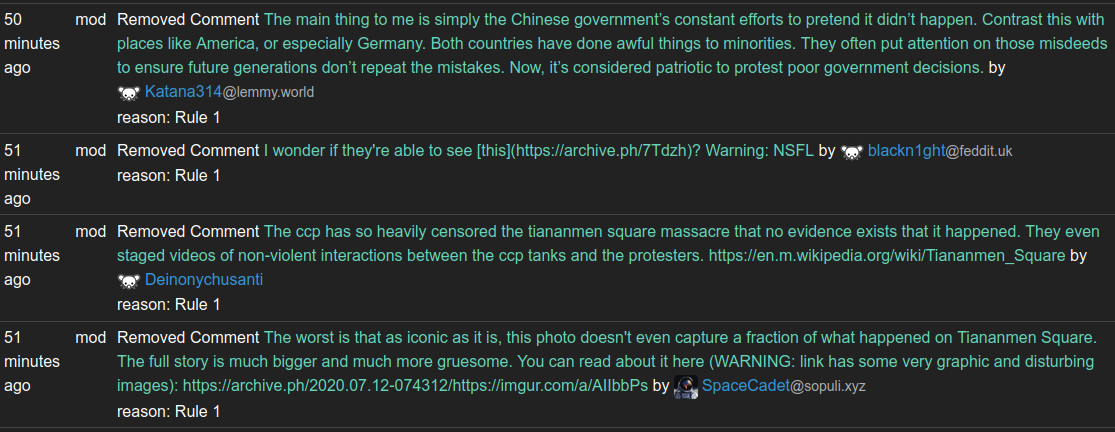Lemmy.ml tankie censorship problem


I feel like we need to talk about Lemmy's massive tankie censorship problem. A lot of popular lemmy communities are hosted on lemmy.ml. It's been well known for a while that the admins/mods of that instance have, let's say, rather extremist and onesided political views. In short, they're what's colloquially referred to as tankies. This wouldn't be much of an issue if they didn't regularly abuse their admin/mod status to censor and silence people who dissent with their political beliefs and for example, post things critical of China, Russia, the USSR, socialism, ...
As an example, there was a thread today about the anniversary of the Tiananmen Massacre. When I was reading it, there were mostly posts critical of China in the thread and some whataboutist/denialist replies critical of the USA and the west. In terms of votes, the posts critical of China were definitely getting the most support.
I posted a comment in this thread linking to "https://archive.ph/2020.07.12-074312/https://imgur.com/a/AIIbbPs" (WARNING: graphical content), which describes aspects of the atrocities that aren't widely known even in the West, and supporting evidence. My comment was promptly removed for violating the "Be nice and civil" rule. When I looked back at the thread, I noticed that all posts critical of China had been removed while the whataboutist and denialist comments were left in place.
This is what the modlog of the instance looks like:

Definitely a trend there wouldn't you say?
When I called them out on their one sided censorship, with a screenshot of the modlog above, I promptly received a community ban on all communities on lemmy.ml that I had ever participated in.
Proof:

So many of you will now probably think something like: "So what, it's the fediverse, you can use another instance."
The problem with this reasoning is that many of the popular communities are actually on lemmy.ml, and they're not so easy to replace. I mean, in terms of content and engagement lemmy is already a pretty small place as it is. So it's rather pointless sitting for example in /c/linux@some.random.other.instance.world where there's nobody to discuss anything with.
I'm not sure if there's a solution here, but I'd like to urge people to avoid lemmy.ml hosted communities in favor of communities on more reasonable instances.
[OT; tl/dr: the issues with forums and user accounts being under hegemony of server instances is by design but it's not actually the way one would design a truely de-centralised network]
It's a feature but not the best practice if the idea would be forums (and users) being free of domains (and the dangers of domains being taken down, and host admins' whims). The design approach of Lemmy however, speaks "hegemony" all over. It says a lot about the mindset of its creators.
An alternative would be indeed distributed directory systems, employing concepts like DHT ... well proven de-centralized resiliency for quite a while. Would it have been done in such a way, there would be no difficulty with migrating forums and users across instances, and even a domain getting lost would not necessarily lead to all forums/accounts there-on to be lost. Also the issues with link creation across instances were due to forums being bound to domain names instead of them having Universal IDs thus being agnostic of which node they are actually hosted on.
ActivityPub, AFAIK only defines a protocol for communicating datasets between instances, not the structures in which federation should be done.
I don't think the idea is for users to be free of domains. One of the key benefits of tying users to their instance is that you defederate from the users of an instance when you defederate from an instance. If users were not bound to instances, it would be hard to defederate from certain groups without manually defederating a million users. Users being tied to domains makes moderation via defederation much, much simpler.
I'm not an expert on ActivityPub but I think you're wrong about this being Lemmy's design decision. I think ActivityPub is designed in this way and it is intentional. I mean, all other ActivityPub apps do the same thing (e.g. Mastodon users are also tied to their instance).
Just want to point out that domain names are also perfectly capable of being agnostic about nodes - i.e. you can host multiple websites on a single computer or distribute the hosting of a website across many computers. I'm not really sure what you're saying here but I don't know if it's important.
Umm... I was not so very clear perhaps. The idea would still be that user accounts as well as forums all contain their domain name, as their site of origin rather than a location identifier. Just that the host could change to any other domain (after negociation with the new host, that is). So it's not about domains being tied to specific hosts/IPs but entities being tied to domains. It would be up for design discussion if that identifier should change or not, iin the case of a migration. The idea would be to give entities the ability to roam or be resurrected from any federated copy in case they are dissatisfied with the policies of their hosts, or in the event a domain gets taken down by authoritrian actors. (That's why this actually is off-topic here)
From my glance into the ActivityPub doc, I concluded that it's really only about the data exchange protocol, yet I might have overlooked something as I never had an in-depth talk with people who implement the thing. Yet, just because many do it in a certain way does not mean to me that this is written in stone somewhere. :-)